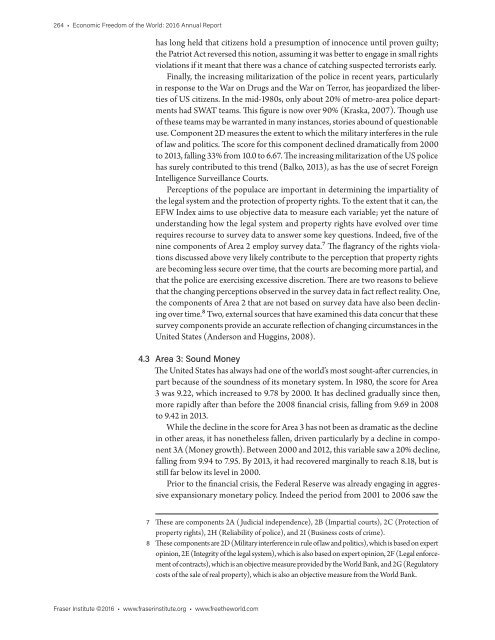Economic Freedom of the World
economic-freedom-of-the-world-2016
economic-freedom-of-the-world-2016
You also want an ePaper? Increase the reach of your titles
YUMPU automatically turns print PDFs into web optimized ePapers that Google loves.
264 • <strong>Economic</strong> <strong>Freedom</strong> <strong>of</strong> <strong>the</strong> <strong>World</strong>: 2016 Annual Report<br />
has long held that citizens hold a presumption <strong>of</strong> innocence until proven guilty;<br />
<strong>the</strong> Patriot Act reversed this notion, assuming it was better to engage in small rights<br />
violations if it meant that <strong>the</strong>re was a chance <strong>of</strong> catching suspected terrorists early.<br />
Finally, <strong>the</strong> increasing militarization <strong>of</strong> <strong>the</strong> police in recent years, particularly<br />
in response to <strong>the</strong> War on Drugs and <strong>the</strong> War on Terror, has jeopardized <strong>the</strong> liberties<br />
<strong>of</strong> US citizens. In <strong>the</strong> mid-1980s, only about 20% <strong>of</strong> metro-area police departments<br />
had SWAT teams. This figure is now over 90% (Kraska, 2007). Though use<br />
<strong>of</strong> <strong>the</strong>se teams may be warranted in many instances, stories abound <strong>of</strong> questionable<br />
use. Component 2D measures <strong>the</strong> extent to which <strong>the</strong> military interferes in <strong>the</strong> rule<br />
<strong>of</strong> law and politics. The score for this component declined dramatically from 2000<br />
to 2013, falling 33% from 10.0 to 6.67. The increasing militarization <strong>of</strong> <strong>the</strong> US police<br />
has surely contributed to this trend (Balko, 2013), as has <strong>the</strong> use <strong>of</strong> secret Foreign<br />
Intelligence Surveillance Courts.<br />
Perceptions <strong>of</strong> <strong>the</strong> populace are important in determining <strong>the</strong> impartiality <strong>of</strong><br />
<strong>the</strong> legal system and <strong>the</strong> protection <strong>of</strong> property rights. To <strong>the</strong> extent that it can, <strong>the</strong><br />
EFW Index aims to use objective data to measure each variable; yet <strong>the</strong> nature <strong>of</strong><br />
understanding how <strong>the</strong> legal system and property rights have evolved over time<br />
requires recourse to survey data to answer some key questions. Indeed, five <strong>of</strong> <strong>the</strong><br />
nine components <strong>of</strong> Area 2 employ survey data.7 The flagrancy <strong>of</strong> <strong>the</strong> rights violations<br />
discussed above very likely contribute to <strong>the</strong> perception that property rights<br />
are becoming less secure over time, that <strong>the</strong> courts are becoming more partial, and<br />
that <strong>the</strong> police are exercising excessive discretion. There are two reasons to believe<br />
that <strong>the</strong> changing perceptions observed in <strong>the</strong> survey data in fact reflect reality. One,<br />
<strong>the</strong> components <strong>of</strong> Area 2 that are not based on survey data have also been declining<br />
over time.8 Two, external sources that have examined this data concur that <strong>the</strong>se<br />
survey components provide an accurate reflection <strong>of</strong> changing circumstances in <strong>the</strong><br />
United States (Anderson and Huggins, 2008).<br />
4.3 Area 3: Sound Money<br />
The United States has always had one <strong>of</strong> <strong>the</strong> world’s most sought-after currencies, in<br />
part because <strong>of</strong> <strong>the</strong> soundness <strong>of</strong> its monetary system. In 1980, <strong>the</strong> score for Area<br />
3 was 9.22, which increased to 9.78 by 2000. It has declined gradually since <strong>the</strong>n,<br />
more rapidly after than before <strong>the</strong> 2008 financial crisis, falling from 9.69 in 2008<br />
to 9.42 in 2013.<br />
While <strong>the</strong> decline in <strong>the</strong> score for Area 3 has not been as dramatic as <strong>the</strong> decline<br />
in o<strong>the</strong>r areas, it has none<strong>the</strong>less fallen, driven particularly by a decline in component<br />
3A (Money growth). Between 2000 and 2012, this variable saw a 20% decline,<br />
falling from 9.94 to 7.95. By 2013, it had recovered marginally to reach 8.18, but is<br />
still far below its level in 2000.<br />
Prior to <strong>the</strong> financial crisis, <strong>the</strong> Federal Reserve was already engaging in aggressive<br />
expansionary monetary policy. Indeed <strong>the</strong> period from 2001 to 2006 saw <strong>the</strong><br />
7 These are components 2A ( Judicial independence), 2B (Impartial courts), 2C (Protection <strong>of</strong><br />
property rights), 2H (Reliability <strong>of</strong> police), and 2I (Business costs <strong>of</strong> crime).<br />
8 These components are 2D (Military interference in rule <strong>of</strong> law and politics), which is based on expert<br />
opinion, 2E (Integrity <strong>of</strong> <strong>the</strong> legal system), which is also based on expert opinion, 2F (Legal enforcement<br />
<strong>of</strong> contracts), which is an objective measure provided by <strong>the</strong> <strong>World</strong> Bank, and 2G (Regulatory<br />
costs <strong>of</strong> <strong>the</strong> sale <strong>of</strong> real property), which is also an objective measure from <strong>the</strong> <strong>World</strong> Bank.<br />
Fraser Institute ©2016 • www.fraserinstitute.org • www.free<strong>the</strong>world.com


